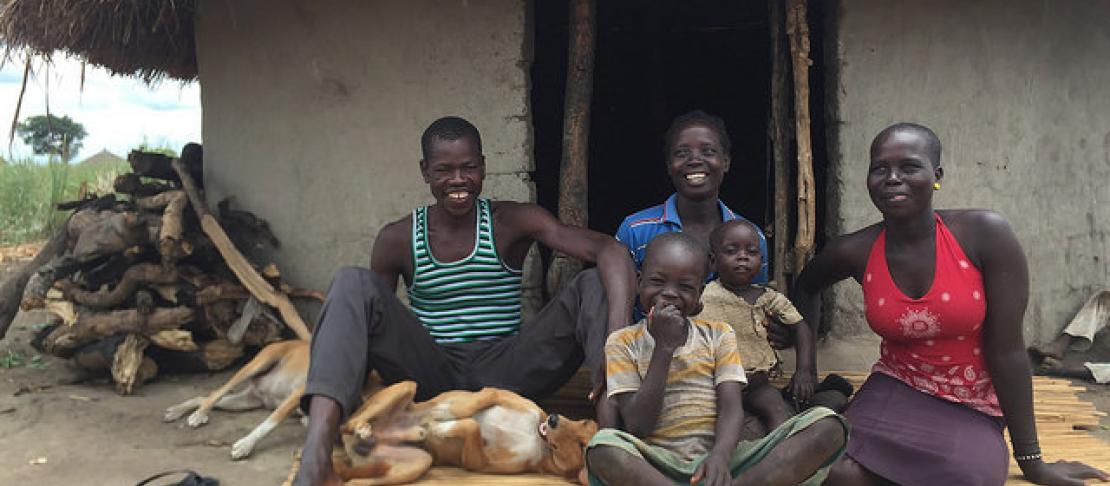Celebrating Africa Day and the future of agriculture in Africa

Climate-smart agriculture can make farming more attractive and profitable for young people, but it comes with its own set of barriers. A recent online discussion highlights the need for youth engagement in climate-smart agriculture and how to make it happen.
Africa has the youngest population of any continent on Earth. As of 2015, 226 million young people (ages 15-24) lived on the continent, with the number expected to more than double by 2055. This burgeoning group of young people provides a wealth of energy and innovation to developing regions. At the same time, unemployment remains a serious concern, with the youth unemployment rate in Sub-Saharan Africa hovering just above 14 percent. Aspirations from the African Union Commission Agenda 2063 include “a prosperous Africa based on inclusive growth and sustainable development.” In order to make this prosperity a reality, investing in young people is paramount.
One such investment comes in the form of agriculture, where the focus should be on making it inclusive, sustainable, and profitable. And, while agriculture employs the vast majority of the population, it is demanding work that is made more difficult by climate change, which is expected to alter temperatures, rainfall patterns, extreme weather events, and crop-related pests across the continent. Climate-smart agriculture (CSA), which aims to increase agricultural sustainability and adaptation, is one way to combat the detrimental effects of climate change.
This year, in celebration of Africa Day, which, since May 25, 1963, has recognized the founding of the Organisation of African Unity (now the African Union), the CGIAR Research Program on Climate Change, Agriculture and Food Security (CCAFS) is showcasing an online discussion, held from 23 April to 21 May, titled “Partnerships, innovations and financing for youth in climate-smart agriculture.” The discussion focused on young people and CSA, specifically innovation, partnerships, financing, and youth engagement in CSA activities.
In regards to youth adoption of CSA practices, one discussion member commented, “young people in colleges of agriculture are keen to embrace CSA,” while also noting that young people face barriers to CSA adoption. Recent research from CCAFS supports this comment, finding young people interested in climate change adaptation, but confronted with numerous barriers, including a lack of capital, land, access to markets, and limited participation in decision-making. Another discussion member underscored the need for youth participation, calling it “ambitious” to “exclude the youth in the CSA decision-making process and expect them to take up the ideas and solutions reached.” Instead, “the youth must be involved in the discussion and decision-making process about CSA to enhance uptake of the innovations designed.”
Youth must be involved in the discussion and decision-making process about CSA to enhance uptake of the innovations designed
The need for enhanced technological approaches was also cited by a number of discussants. “CSA should encompass modern Information and Communication Technology (ICT)-based approaches such as e-learning, discussion forums, and video conferencing to spread information to the youths,” said one participant. Another suggested “flood[ing] the digital space with CSA content” and CSA-based video games were put forth by a third participant.
Given the complexity of climate change, and its impact on agriculture, CSA partnerships were also discussed. One discussion member stressed the need for partnerships to be “multi-disciplinary and integrative” and another the need for strategic partnerships. Still, another discussant cautioned that partnerships come with their own form of disadvantages, noting, “for these partnerships to work, all parties must get benefits according to the energy they invest and must agree before commencing.” The discussion ended with a conversation about financing, with commenters calling for specific funds to be set aside for young people, better processes for youth to apply for and receive funds, and leaders that focus on and understand the needs of young people.
Agriculture will continue to be the cornerstone of livelihoods and economic development in Africa. Supporting young people and providing a platform for their contributions to climate change solutions is essential.
Read more:
- Working paper: Youth Decision Making in Agricultural Adaptation to Climate Change: An Analysis in East Africa
- Blog post: International Youth Day is a reminder of youth’s role in agriculture, development and peace
- Blog post: Farming the future: the role of youth in agriculture and climate change
Kathlee Freeman is a Communications Consultant with the CGIAR Research Program on Climate Change, Agriculture and Food Security (CCAFS).



